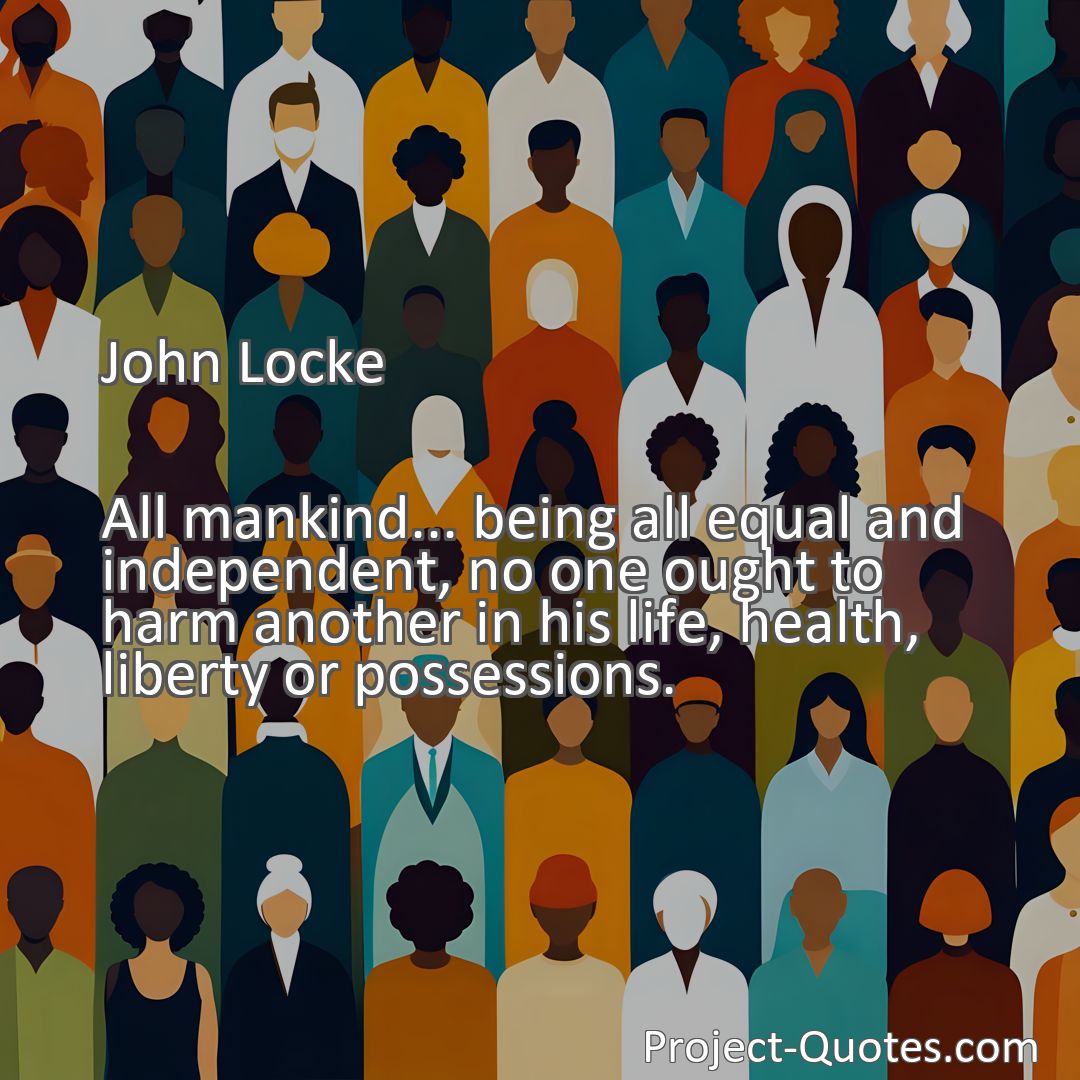All mankind… being all equal and independent, no one ought to harm another in his life, health, liberty or possessions.
John Locke
John Locke’s quote on equality and individual rights goes beyond philosophical ideals, resonating with contemporary issues and emphasizing the importance of empathy and compassion in combating social injustices. His words also reverberate in politics, highlighting the significance of democratic governance and the protection of individual rights. Embracing Locke’s principles fosters a society characterized by respect, fairness, and harmony.
Table of Contents
- 1 All mankind… being all equal and independent, no one ought to harm another in his life, health, liberty or possessions.
- 2 John Locke
- 3 Meaning of Quote – All mankind… being all equal and independent, no one ought to harm another in his life, health, liberty or possessions.
- 4 Freely Shareable Quote Image
- 5 Related
Meaning of Quote – All mankind… being all equal and independent, no one ought to harm another in his life, health, liberty or possessions.
In his famous quote, John Locke, a renowned philosopher, sheds light on the importance of equality and respect for individual rights within society. Locke posits that all human beings are created as equals, possessing the same inherent value and independence. According to him, no one has the right to harm another person in their life, health, liberty, or possessions.
Locke’s words resonate even today, as they emphasize the fundamental principles of human rights and the significance of treating others with fairness and kindness. This sentiment is crucial in fostering a harmonious and just society where everyone can thrive without fear of oppression or harm.
The concept of equality that Locke highlights goes beyond superficial differences such as race, gender, or social status. He argues that deep down, all individuals are equal and should be treated as such. This principle challenges the notion of any form of discrimination or prejudice that threatens to divide people based on these external characteristics. Instead, it advocates for a society that honors and respects every human being, regardless of their background or circumstances.
By emphasizing the importance of respecting others’ lives, Locke underscores the intrinsic value of each individual’s existence. This statement serves as a reminder that no one has the right to deliberately take another person’s life. Every life is precious, and everyone should have the opportunity to live without the fear of violence or harm. Acknowledging this fundamental principle helps cultivate a sense of empathy and compassion, nurturing a society that values the sanctity of life.
Furthermore, Locke specifically includes “health” in his list of things that should not be harmed. This inclusion demonstrates his recognition of physical and mental well-being as integral components of a fulfilling life. Health encompasses not only the absence of illness or disease but also the state of well-being that allows individuals to flourish in various aspects of their lives. It is within everyone’s interest to promote and protect the health of one another, ensuring a community that thrives together.
Liberty, another concept mentioned by Locke, refers to the freedom and autonomy that individuals have over their own lives. Locke argues that no one should infringe upon another person’s liberty, as it is a fundamental right that should be cherished and upheld. This notion of liberty encompasses both personal freedom and the ability to make choices without undue interference. Embracing this principle fosters an environment of respect and individual sovereignty, allowing each person to express themselves authentically and engage in activities that bring them joy and fulfillment.
Locke’s mention of possessions in his quote highlights the importance of respecting others’ property rights. Recognizing the significance of possessions encourages a culture of trust and accountability within society. It reinforces the idea that individuals have the right to own and enjoy the fruits of their labor without fear of unjust confiscation or theft. Respecting others’ possessions fosters a sense of security and stability, creating an atmosphere where people can thrive and prosper.
The implications of Locke’s quote extend beyond mere philosophical ideals. They offer a moral and ethical framework for building a just society characterized by mutual respect and fairness. Embracing these principles necessitates a collective commitment to upholding human rights and treating others with dignity.
In the context of contemporary issues, Locke’s quote resonates strongly. It addresses the importance of empathy and compassion in combating social injustices such as discrimination, oppression, and systemic inequalities. It serves as a call to action, urging individuals to consider the consequences of their actions on others and work towards creating a society that upholds the principles of equality and respect.
Locke’s words also reverberate in the realm of politics, emphasizing the significance of democratic governance and the protection of individual rights through just laws. As a philosopher who played a significant role in shaping modern political thought, Locke’s ideas continue to influence discussions surrounding government structures and the relationship between the state and its citizens.
In conclusion, John Locke’s quote serves as a powerful reminder of the inherent equality and independence that all human beings possess. It highlights the importance of treating others with respect and upholding their rights to life, health, liberty, and possessions. Embracing these principles fosters a society characterized by compassion, fairness, and harmony. Reflecting on Locke’s words can inspire positive change in individuals, communities, and society as a whole, reminding us of our shared responsibility to create a world where everyone can thrive and flourish.
I hope this quote inspired image brings you hope and peace. Share it with someone who needs it today!


